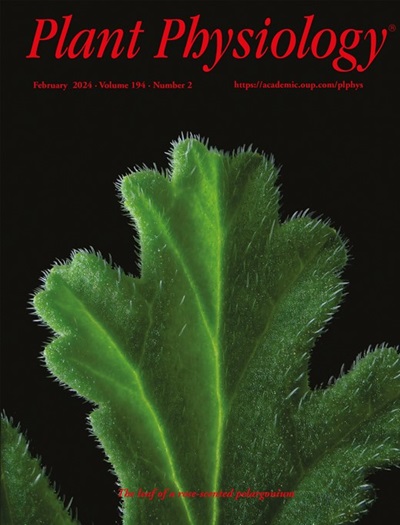Epigenetic memory of temperature sensed during somatic embryo maturation in 2-year-old maritime pine trees
IF 6.9
1区 生物学
Q1 PLANT SCIENCES
引用次数: 0
Abstract
Embryogenesis is a brief but potentially critical phase in the tree life cycle for adaptive phenotypic plasticity. Using somatic embryogenesis in maritime pine (Pinus pinaster Ait.), we found that temperature during the maturation phase affects embryo development and post-embryonic tree growth for up to three years. We examined whether this somatic stress memory could stem from temperature- and/or development-induced changes in DNA methylation. For this, we developed a 200 Mb custom sequence capture bisulfite analysis of genes and promoters to identify differentially methylated cytosines (DMCs) between temperature treatments (18, 23, and 28°C) and developmental stages (immature and cotyledonary embryos, shoot apical meristem of 2-year-old plants) and investigate if these differences can be mitotically transmitted from embryonic to post-embryonic development (epigenetic memory). We revealed a high prevalence of temperature-induced DMCs in genes (8-14%) compared to promoters (less than 1%) in all 3 cytosine contexts. Developmental DMCs showed a comparable pattern but only in the CG context and with a strong trend towards hypomethylation, particularly in the promoters. A high percentage of DMCs induced by developmental transitions were found memorized in genes (up to 45-50%) and promoters (up to 90%). In contrast, temperature-induced memory was lower and confined to genes after both embryonic (up to 14%) and post-embryonic development (up to 8%). Using stringent criteria, we identified ten genes involved in defense responses and adaptation, embryo development, and chromatin regulation that are candidates for the establishment of a persistent epigenetic memory of temperature sensed during embryo maturation in maritime pine. Here, we provide evidence that DNA methylation marks established during the embryonic phase are transmitted to the post-embryonic plant development phase.2 年树龄的海洋松树在体细胞胚胎成熟过程中对温度的表观遗传记忆
胚胎发生是树木生命周期中一个短暂但对适应性表型可塑性具有潜在关键作用的阶段。我们利用海洋松(Pinus pinaster Ait.)的体细胞胚胎发生发现,成熟阶段的温度会影响胚胎发育和胚胎后树木生长长达三年。我们研究了这种体细胞应激记忆是否源于温度和/或发育引起的 DNA 甲基化变化。为此,我们开发了一个 200 Mb 的定制序列捕获基因和启动子的亚硫酸氢盐分析,以鉴定温度处理(18、23 和 28°C)和发育阶段(未成熟胚和子叶胚、2 年生植株的嫩枝顶端分生组织)之间不同的甲基化胞嘧啶 (DMC),并研究这些差异是否会从胚胎到胚后发育的有丝分裂传递(表观遗传记忆)。我们发现,在所有三种胞嘧啶上下文中,温度诱导的 DMCs 在基因中的发生率很高(8-14%),而在启动子中的发生率则低于 1%。发育阶段的DMCs显示出相似的模式,但只在CG上下文中出现,而且有强烈的低甲基化趋势,尤其是在启动子中。在基因(高达 45-50%)和启动子(高达 90%)中,发育转变诱导的 DMCs 有很高的记忆率。相比之下,温度诱导的记忆率较低,且仅限于胚胎发育(高达 14%)和胚胎后发育(高达 8%)后的基因。利用严格的标准,我们确定了 10 个涉及防御反应和适应、胚胎发育和染色质调控的基因,这些基因是建立海洋松胚胎成熟过程中温度感应持久表观遗传记忆的候选基因。在这里,我们提供的证据表明,在胚胎阶段建立的 DNA 甲基化标记会传递到胚胎后的植物发育阶段。
本文章由计算机程序翻译,如有差异,请以英文原文为准。
求助全文
约1分钟内获得全文
求助全文
来源期刊

Plant Physiology
生物-植物科学
CiteScore
12.20
自引率
5.40%
发文量
535
审稿时长
2.3 months
期刊介绍:
Plant Physiology® is a distinguished and highly respected journal with a rich history dating back to its establishment in 1926. It stands as a leading international publication in the field of plant biology, covering a comprehensive range of topics from the molecular and structural aspects of plant life to systems biology and ecophysiology. Recognized as the most highly cited journal in plant sciences, Plant Physiology® is a testament to its commitment to excellence and the dissemination of groundbreaking research.
As the official publication of the American Society of Plant Biologists, Plant Physiology® upholds rigorous peer-review standards, ensuring that the scientific community receives the highest quality research. The journal releases 12 issues annually, providing a steady stream of new findings and insights to its readership.
 求助内容:
求助内容: 应助结果提醒方式:
应助结果提醒方式:


